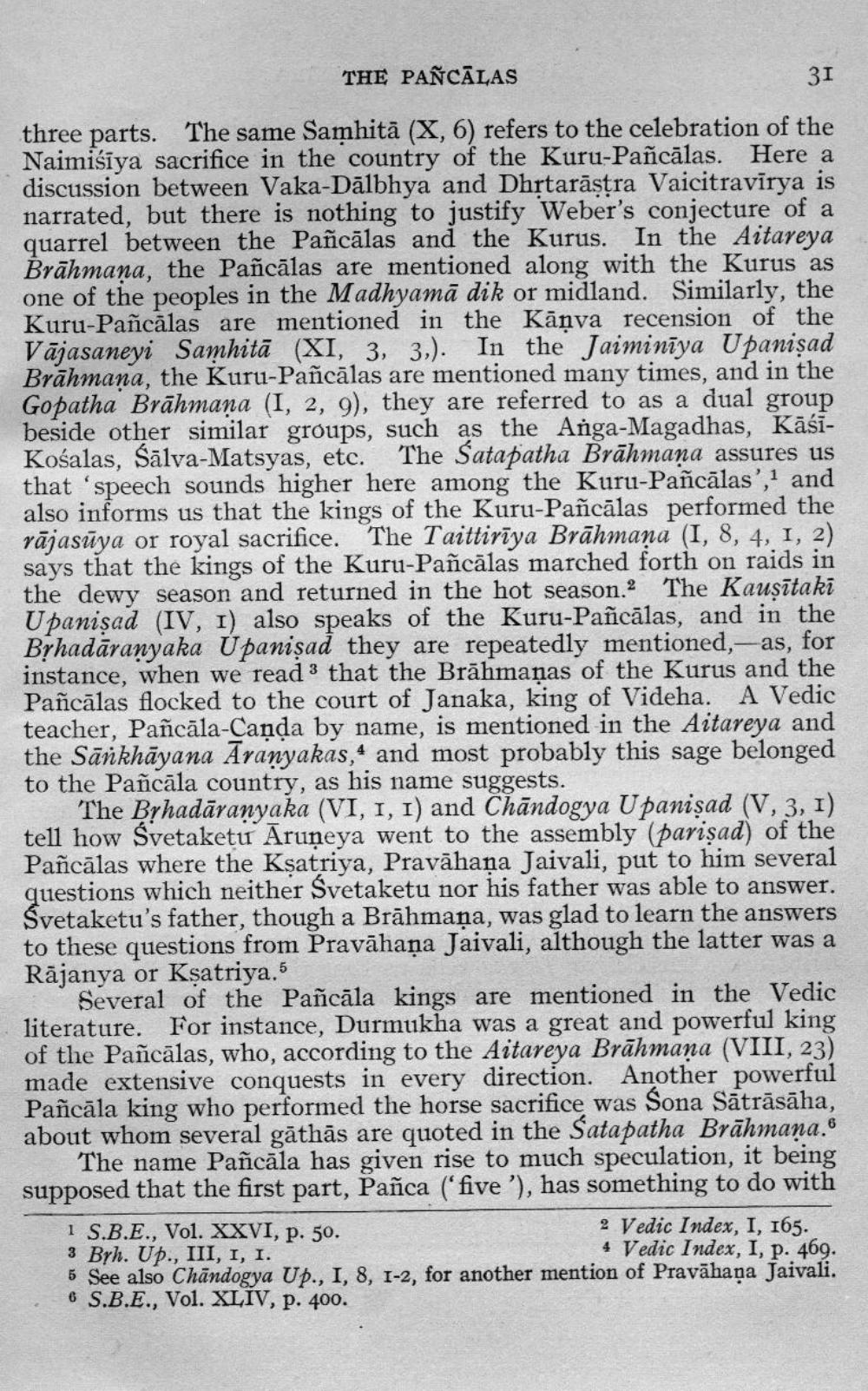________________
THE PAÑCĀLAS
31 three parts. The same Samhitā (X, 6) refers to the celebration of the Naimisiya sacrifice in the country of the Kuru-Pañcālas. Here a discussion between Vaka-Dālbhya and Dhrtarāstra Vaicitravīrya is narrated, but there is nothing to justify Weber's conjecture of a quarrel between the Pañcālas and the Kurus. In the Aitareya Brāhmaṇa, the Pañcālas are mentioned along with the Kurus as one of the peoples in the Madhyamā dik or midland. Similarly, the Kuru-Pañcālas are mentioned in the Kāņva recension of the Vājasaneyi Samhitā (XI, 3, 3,). In the Jaiminīya Upanişad Brāhmana, the Kuru-Pañcālas are mentioned many times, and in the Gopatha Brāhmaṇa (I, 2, 9), they are referred to as a dual group beside other similar groups, such as the Anga-Magadhas, KāśiKośalas, Sālva-Matsyas, etc. The Satapatha Brāhmana assures us that 'speech sounds higher here among the Kuru-Pañcālas’,1 and also informs us that the kings of the Kuru-Pañcālas performed the rājasūya or royal sacrifice. The Taittirīya Brāhmana (I, 8, 4, 1, 2) says that the kings of the Kuru-Pañcālas marched forth on raids in the dewy season and returned in the hot season. The Kaușītaki Upanisad (IV, I) also speaks of the Kuru-Pañcālas, and in the Brhadāranvaka Upanisad they are repeatedly mentioned, -as, for instance, when we read that the Brāhmaṇas of the Kurus and the Pañcālas flocked to the court of Janaka, king of Videha. A Vedic teacher, Pañcāla-Caņda by name, is mentioned in the Aitareya and the Sānkhāyana Āranyakas, 4 and most probably this sage belonged to the Pañcāla country, as his name suggests.
The Byhadāranyaka (VI, 1, 1) and Chāndogya Upanişad (V, 3, 1) tell how Svetaketu Āruņeya went to the assembly (parişad) of the Pañcālas where the Ksatriya, Pravāhaņa Jaivali, put to him several questions which neither Svetaketu nor his father was able to answer. Svetaketu's father, though a Brāhmaṇa, was glad to learn the answers to these questions from Pravāhaņa Jaivali, although the latter was a Rājanya or Ksatriya.5
Several of the Pañcāla kings are mentioned in the Vedic literature. For instance, Durmukha was a great and powerful king of the Pañcālas, who, according to the Aitareya Brāhmana (VIII, 23) made extensive conquests in every direction. Another powerful Pañcāla king who performed the horse sacrifice was Sona Sātrāsāha, about whom several gāthās are quoted in the Satapatha Brāhmaṇa.
The name Pañcāla has given rise to much speculation, it being supposed that the first part, Pañca ('five '), has something to do with 1 S.B.E., Vol. XXVI, p. 50.
2 Vedic Index, I, 165. 3 Brh. Up., III, I, I.
4 Vedic Index, I, p. 469. 5 See also Chāndogya Up., I, 8, 1-2, for another mention of Pravāhaņa Jaivali. 6 S.B.E., Vol. XLIV, p. 400.




